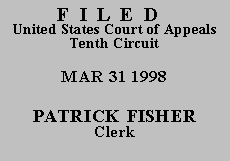

| DON RIFFEL, |
No. 97-6304 (D.C. No. CIV-96-1179-A) |
Neither party to this appeal has requested oral argument. After examining the briefs and the appellate record, this three-judge panel has determined unanimously that oral argument would not be of material assistance in the determination of this appeal. See Fed. R. App. P. 34(a); 10th Cir. R. 34.1.9. The cause is therefore ordered submitted without oral argument.
In August, 1993, Don Riffel, then 55 years of age, was hired by the Oklahoma Gas and Electric Company ("OG&E"). On March 14, 1995, Riffel, then 56 years of age, was terminated by OG&E. On July 23, 1996, Riffel filed an action in the United States District Court for the Western District of Oklahoma against OG&E, alleging that he had been unlawfully terminated because of his age in violation of the Age Discrimination and Employment Act ("ADEA"), 29 U.S.C. § 621, et seq.
By answer filed on August 14, 1995, OG&E admitted or denied the various allegations in the complaint, and affirmatively alleged, inter alia, that Riffel was "an employee at will who could be terminated at any time with or without cause," but that, in fact, he "was terminated for legitimate non-discriminatory reasons." Discovery ensued, which included depositions of Riffel and various employees of OG&E. On June 2, 1997, OG&E filed a motion for summary judgment and a brief in support thereof. Attached thereto were parts of various depositions. On July 7, 1997, Riffel filed a response to OG&E's motion for summary judgment, with parts of several depositions being attached thereto.
On July 31, 1997, the district court granted OG&E's motion for summary judgment. Judgment for OG&E was thereafter duly entered, and Riffel appeals that judgment. We reverse.
In its order granting summary judgment, the district court, on the basis of the record before it, concluded that Riffel had shown a prima facie case of age discrimination. However, the district court went on to hold that OG&E had articulated a legitimate non-discriminatory business reason for terminating Riffel, i.e., unsatisfactory job performance. And the district court then held that Riffel did not demonstrate that the reason given was pretextual, nor had he produced "direct evidence of age discrimination." In its order, the district court relied on Jones v. Unisys Corporation, 54 F.3d 624, 632 (10th Cir. 1995).
We reverse on the basis of the testimony given by David A. Tinkle in his deposition, which, as we understand it, was attached to Riffel's response to OG&E's motion for summary judgment and was a part of the record before the district court. In our view, Tinkle's testimony constitutes some "direct evidence of age discrimination" and forecloses summary judgment for OG&E.
OG&E's position was, and is, that it had a legitimate nondiscriminatory reason for discharging Riffel, i.e., poor on-the-job performance, which was non-pretextual in nature and not refuted by direct evidence of age discrimination. A part of Riffel's argument, on appeal, is that Tinkle's testimony given upon deposition is some direct evidence of age discrimination and the "smoking gun" which "wards off summary judgment." We agree with Riffel.
Riffel was discharged by his supervisor, John Singleton, on March 14, 1995. Tinkle was a fellow employee of Riffel's who had been employed by OG&E for some eighteen years. Tinkle testified, upon deposition, that Riffel had often been referred to by "management" as "the old man," and, specifically, had been referred to as "the old man" by John Singleton.(1) Tinkle also testified that a few days after Singleton fired Riffel, he heard Singleton, at a company meeting, say, referring to Riffel, "I'm not going to back that old man." Tinkle also indicated that, on that same occasion, Singleton said, in essence, "if it had been anybody else, I would have gone to bat for him. You know how old men are, they are--they aren't going to change." As indicated, Riffel argues that Tinkle's testimony constitutes direct evidence of age discrimination on the part of Singleton and is the "smoking gun" which precludes summary judgment.
So far as we can tell from the record before us, Tinkle's testimony, in this regard, was not challenged by Singleton, or any other person deposed. Even if challenged, there would probably then be a disputed genuine issue of material fact. But as already noted, Tinkle's testimony that Singleton indicated he would have "gone to bat" for Riffel, but for the latter's age, is not challenged in the record before us. This is not an instance of a "stray remark" in the work place made by a fellow employee not in the decision making process. Hence Jones v. Unisys Corporation, 54 F.3d 624, 632 (10th Cir. 1995) and Cone v. Longmont United Hospital Association, 14 F.3d 526, 531 (10th Cir. 1994), relied on by OG&E, are inapplicable. We note that most of the age discrimination cases are based on purely circumstantial evidence. Here there is some direct evidence of age discrimination on the part of Singleton, who was Riffel's supervisor and the one who fired him, which, in our view, precludes summary judgment for OG&E.
Judgment reversed.
ENTERED FOR THE COURT,
Robert H. McWilliams
Senior Circuit Judge
*. This order and judgment is not binding precedent, except under the doctrines of law of the case, res judicata, and collateral estoppel. This court generally disfavors the citation of orders and judgments; nevertheless, an order and judgment may be cited under the terms and conditions of 10th Cir. R. 36.3.
1.In his deposition, Riffel testified that John Singleton had, on occasion, called him an "old man" to his face, and on one occasion had said that "I'm going to put the old man on the rock truck and you will probably both retire together."